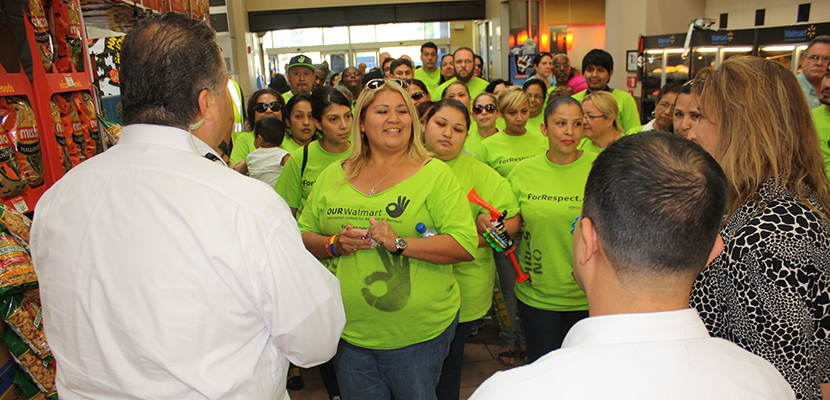I remember that strike
I remember when that strike happened. Proud to know you back in the day!

A march on the boss may be big, like this 2012 Walmart strike, or small, like a dozen cafeteria workers deciding not to put up with an oozing drain. Photo: UFCW CC BY-NC 2.0, cropped.
A few years ago I was working for Princeton University Campus Dining as a member of Service Employees (SEIU) Local 175, a small, tough local that represents most of the blue-collar staff at Princeton and no one else.
I had worked lots of food service jobs, ever since I was a teenager, from fancy restaurants to fast food. But at Princeton, because we had a strong contract and good stewards, the pace was more humane; we worked with better protections and more dignity. And we got paid a lot better!
One night I was working the Deli, making salads and hoagies to order, when I started to notice a puddle slowly advancing into my area from the back kitchen. The liquid looked like it was coming out of the floor drains.
The puddle spread and spread. Soon much of the Deli, Stir-Fry, Pizza, and Grill stations had a half-inch of water. The back kitchen was totally unusable.
Managers were frantically trying to move things around to prevent any interruptions in the dinner service and to keep students from seeing what was happening. It slowly dawned on me that this was unsafe: it was a matter of time before someone slipped, and we didn’t actually know the nature of the puddle—it didn’t smell great, and it was coming up from the drain.
A friend and I had recently been appointed stewards, but we hadn’t yet done much. We hadn’t even gone to a steward training. My fellow steward, who was working pizza, rushed over to me. “What are we going to do about this?” she said urgently. “We’re the stewards on this shift now, you know.” She was starting to get a headache from the puddle smell.
We started to go back and forth with some of the managers: it wasn’t safe, we should stop serving dinner, we said. They thought continuing to serve was more important, even though they couldn’t tell us what the liquid was.
There was only 40 minutes left in the dinner service, but there were hours to go when we would be cleaning up, serving late-night snacks, and breathing in the fumes.
My friend said she wouldn’t work in these conditions, and so I said I wouldn’t either. We talked to the dozen workers at other stations and told them that they should stop too.
About half of us went out to the dining area and sat down, to get away from the smell and to show that we weren’t going back to work. The managers came out and called us all down to the loading dock for an emergency meeting.
My heart was racing. It was strange to look around this hall with hundreds of students eating and realize that they had no idea that we were taking action on the job right in front of their eyes!

Give $10 a month or more and get our "Fight the Boss, Build the Union" T-shirt.
I felt proud and a little amazed at what was happening. I would never have felt like I could do this at a non-union food service job, but I knew that our union contract and the relationships we had with students (mainly through the Young Democratic Socialists club) gave us a lot more protection than I had ever had before.
None of the workers in this cafeteria were students, but we knew that the students cared about us and had our backs, and Princeton University was always scared to offend its highest-paying customers.
When we got to the loading dock, the managers were apologizing for the puddle and telling us that it was OK that we had stopped work, but also that they needed us to come back and help clean. I called our union president and put him on speaker.
He started to talk to us and as a group, we decided that this was now a union meeting. We asked the managers to leave so we could talk to him privately. They immediately obeyed. The president of our local always took the workers’ side and always backed us up. We knew he would tell us what we needed to know, and the managers knew not to mess with him.
We talked about what our rights were, our concerns about working in the liquid and the fumes. We voted that none of us would go back to work to clean until they got a plumber or some other qualified professional who could get the puddle down the drain.
We told the managers—and they told us that we would all be paid for our entire shifts. Most of us left, although a couple people did go back upstairs and work anyway.
As I was riding home, I felt flabbergasted that we had won so completely.
Different situations at work have different solutions. Some things you have to address slowly over time. Some things you have to bring to the bargaining table. For some things you have to change the law.
But sometimes there are problems that a dozen co-workers can fix right then and there, with just some solidarity and bravery. I hope you think of this story the next time you’re in a situation like that.
Russell Weiss-Irwin now teaches in Boston and is a member of the Boston Teachers Union, AFT Local 66.
I remember when that strike happened. Proud to know you back in the day!